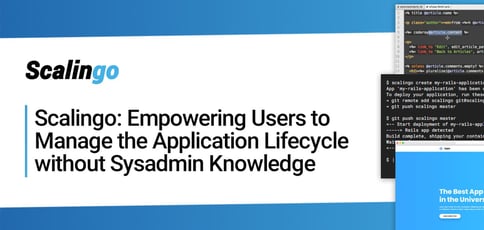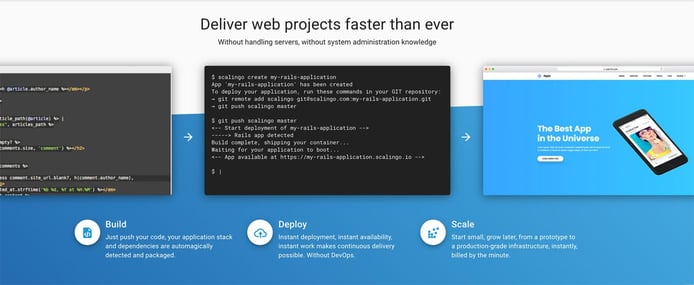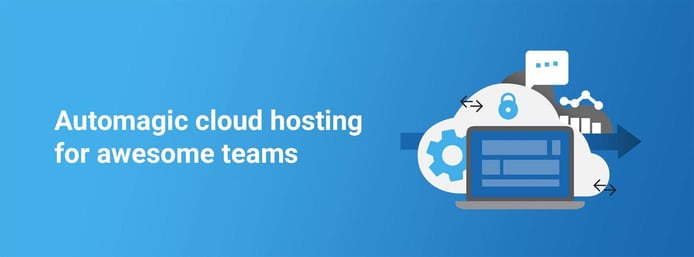
TL; DR: Scalingo’s high-availability Platform-as-a-Service (PaaS) solution empowers developers to manage the application life cycle independently of operations or sysadmin teams. The platform, which is fully managed and production-ready, provides users a place to host their web and IoT projects without dealing with servers, application stacks, software dependencies, or databases. Ultimately, the developer-friendly company, built on years of programming experience, is working to serve an even larger customer base through continued growth.
It’s hard to keep up with the acronym-packed world of technology delivered via the “as a service” model. But essentially, the products, tools, and technologies provided under these labels are all accessible over the internet.
In cloud computing, the model is organized into three main categories: Software-as-a-Service (SaaS), Infrastructure-as-a-Service (IaaS), and Platform-as-a-Service (PaaS). Many more extend from there.
The same phenomenon is occurring in the operations world, where concepts like IT operations (ITOps), Software Developer Operations (DevOps), and No Operations (NoOps) provide different ways for companies to become agile and secure.
But sparks really fly when you pair these two worlds. For example, as a PaaS-based NoOps platform, Scalingo empowers users to build, run, and manage applications in an automated software environment (the PaaS part) — eliminating the need for an operations team (i.e., NoOps).

Scalingo is on a mission to make the lives of developers easier.
“We save tech teams a lot of time on tasks they would prefer not to do, such as manage servers, application stacks, and databases,” said Luca Fancello, Head of Growth at Scalingo. “Our fully automated platform hosts web and IoT projects so teams can spend time focusing on development.”
The production-ready tool is budget-friendly, featuring flexible hosting plans that empower users to scale up or down as necessary. It also supports a wide range of popular databases, frameworks, and languages that developers know and love.
Ultimately, Scalingo aims to help dev teams manage the life cycles of the web apps, databases, and IoT applications they create, run, and maintain in their entirety — without the help of sysadmins or operations departments. The versatility, security, high availability, and expert support Scalingo brings make it an ideal solution for European companies looking to accelerate innovation.
Empowering Software Teams to Manage App Life Cycles Their Way
Scalingo was founded in 2015 by Yann Klis and Léo Unbekandt, two friends who understood from the start that not every developer is a system administrator.
“Yann used to own a website-building company,” Luca said. “At the time, both of them realized that developers were wasting a lot of time dealing with DevOps and sysadmin teams. That’s why they created Scalingo — to make the developer’s life as easy as possible.”
Today, more than 300 teams across 17 countries use Scalingo to host more than 2,400 applications. The platform produces 22,500 lines of code each month and processes more than 30 million requests.
Scalingo’s language, framework, and database-agnostic approach makes it accessible to a broad user base. The platform supports 40 programming languages, including Django, NodeJS, PHP, Python, Java, Magento, and Ruby on Rails, among other popular options. Users can choose from six databases: Elasticsearch, InfluxDB, MySQL, MongoDB, PostgreSQL, and Redis.

Scalingo helps developers build, deploy, and scale apps without sysadmin intervention.
In June, Scalingo announced support for MySQL 8.0, the latest version of the popular database. This release brings developers better cluster management, a new default authentication mechanism, improved geography support, and support for both JSON-formatted fields and geospatial data.
In addition to the choice of languages and databases, Scalingo’s PaaS platform also boasts useful add-ons like the Transmission Control Protocol (TCP) Gateway, allowing users to easily deploy, scale, and manage TCP apps.
“What Scalingo is trying hard to do is to offer developers a platform that’s as easy as possible to use,” Luca said. “That means offering support for most of the languages and databases on the market. It was a big challenge that took a lot of development time, but it’s something that our clients need.”
Continuous Improvements and a Focus on Compliance
Luca told us that Scalingo is also working to enhance the platform to the benefit of its customers.
For example, data privacy has been a top priority for businesses worldwide in recent years, particularly within the context of laws such as the European Union’s General Data Protection Regulation (GDPR).
To comply with such regulations, a business must look inwardly at its own practices, and outwardly, at those of its providers. Fortunately, Scalingo has been GDPR-compliant since before regulation went into effect and enforces the regulation to protect the user data it stores.
“We provide a lot of value when it comes to data sovereignty,” Luca told us. “To ensure compliance with GDPR, we protect both the billing information of our direct customers and the personal data of those who use our customers’ web apps.”
The company’s thorough Data Processing Agreement, available online, details its commitments regarding GDPR. Scalingo customers who qualify as a Data Controller under the GDPR and need a Data Processing Agreement (DPA) in place can work with Scalingo as a qualifying vendor to make the process easier.

Scalingo’s magic comes from automation, not the supernatural.
In June, Scalingo announced that it had become the first PaaS company to offer application and data hosting in a datacenter that is compliant with the French National Cybersecurity Agency’s (ANSSI) SecNumCloud standard.
The company’s presence in a SecNumCloud region will help French companies solve challenges around data security and sovereignty.
“In the context of cybersecurity, the security visas issued by the ANSSI are a guarantee of confidence for the Cloud in France and in Europe,” said Yann Klis, co-founder and CEO of Scalingo, in a press release. “We are proud to be able to allow our customers to use a SecNumCloud-qualified datacenter. This security visa represents the highest level of requirement.”
The company’s compliance roadmap also includes goals to achieve the ISO 27001 and HDS certifications, the latter of which is French equivalent of HIPAA, in 2021.
Luca told us that the company’s internal development processes involve adapting to the latest regulations and trends as well as listening to feedback from customers.
“Obviously, being a tech company, there’s always more to do than the time that is available to developers,” he said. But many of our features, for example, the multiple languages and databases that we’ve launched support for, came about as a result of customer requests.”
Expanding the Team to Better Serve Customers
Unlike some companies, Scalingo doesn’t keep its future plans under tight wraps. The product’s future is clearly laid out in Scalingo’s Product Roadmap, a transparent document available publicly on Trello.
Users can use the Product Roadmap to submit requests, track in-progress changes, and request access to private beta trials. Luca told us his company’s focus on product development is strong because it was built for developers by developers.
“For years, there were only developers and product people on the team,” he said. “Last year we made a few new hires, including a specialist of security — a position previously owned by the CTO. But security, again, is in the realm of the developer.”
The Scalingo team has doubled in number in less than a year. Last year, the company hired Luca himself to help with an overall focus on growth and marketing. Luca said he’s the first hire without a background in development.
“Basically, the company has been growing, is still growing, and is always working to make the best possible product for our customers backed by awesome support,” Luca said.
HostingAdvice.com is a free online resource that offers valuable content and comparison services to users. To keep this resource 100% free, we receive compensation from many of the offers listed on the site. Along with key review factors, this compensation may impact how and where products appear across the site (including, for example, the order in which they appear). HostingAdvice.com does not include the entire universe of available offers. Editorial opinions expressed on the site are strictly our own and are not provided, endorsed, or approved by advertisers.
Our site is committed to publishing independent, accurate content guided by strict editorial guidelines. Before articles and reviews are published on our site, they undergo a thorough review process performed by a team of independent editors and subject-matter experts to ensure the content’s accuracy, timeliness, and impartiality. Our editorial team is separate and independent of our site’s advertisers, and the opinions they express on our site are their own. To read more about our team members and their editorial backgrounds, please visit our site’s About page.

